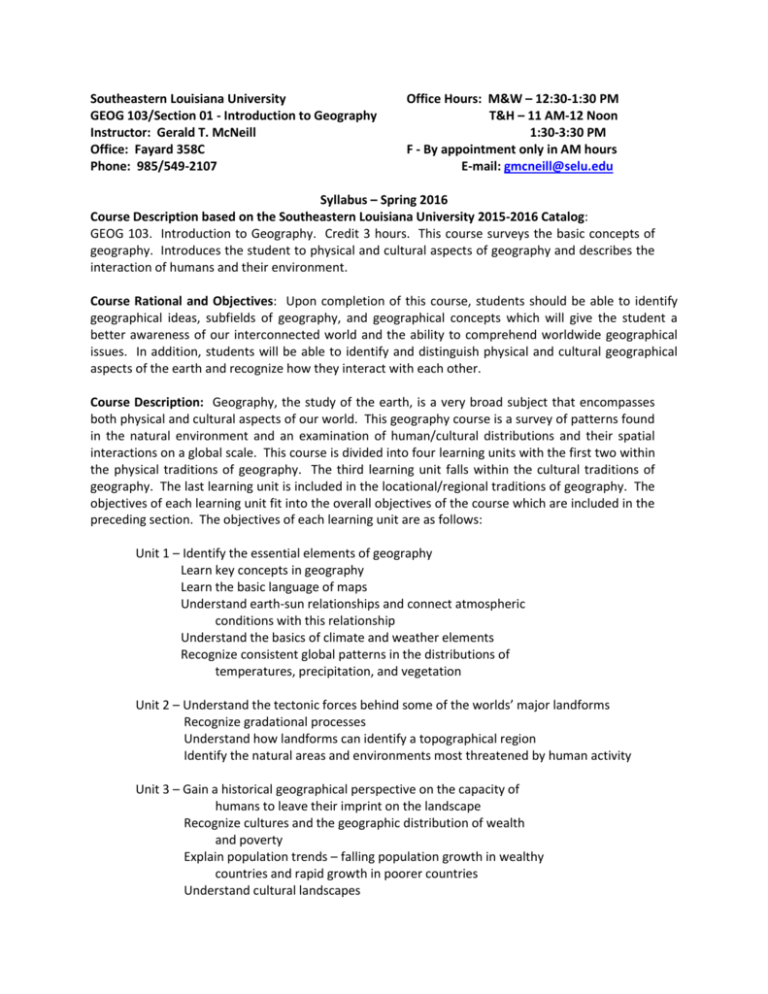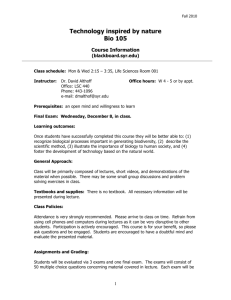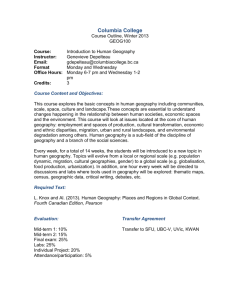
Southeastern Louisiana University
GEOG 103/Section 01 - Introduction to Geography
Instructor: Gerald T. McNeill
Office: Fayard 358C
Phone: 985/549-2107
Office Hours: M&W – 12:30-1:30 PM
T&H – 11 AM-12 Noon
1:30-3:30 PM
F - By appointment only in AM hours
E-mail: gmcneill@selu.edu
Syllabus – Spring 2016
Course Description based on the Southeastern Louisiana University 2015-2016 Catalog:
GEOG 103. Introduction to Geography. Credit 3 hours. This course surveys the basic concepts of
geography. Introduces the student to physical and cultural aspects of geography and describes the
interaction of humans and their environment.
Course Rational and Objectives: Upon completion of this course, students should be able to identify
geographical ideas, subfields of geography, and geographical concepts which will give the student a
better awareness of our interconnected world and the ability to comprehend worldwide geographical
issues. In addition, students will be able to identify and distinguish physical and cultural geographical
aspects of the earth and recognize how they interact with each other.
Course Description: Geography, the study of the earth, is a very broad subject that encompasses
both physical and cultural aspects of our world. This geography course is a survey of patterns found
in the natural environment and an examination of human/cultural distributions and their spatial
interactions on a global scale. This course is divided into four learning units with the first two within
the physical traditions of geography. The third learning unit falls within the cultural traditions of
geography. The last learning unit is included in the locational/regional traditions of geography. The
objectives of each learning unit fit into the overall objectives of the course which are included in the
preceding section. The objectives of each learning unit are as follows:
Unit 1 – Identify the essential elements of geography
Learn key concepts in geography
Learn the basic language of maps
Understand earth-sun relationships and connect atmospheric
conditions with this relationship
Understand the basics of climate and weather elements
Recognize consistent global patterns in the distributions of
temperatures, precipitation, and vegetation
Unit 2 – Understand the tectonic forces behind some of the worlds’ major landforms
Recognize gradational processes
Understand how landforms can identify a topographical region
Identify the natural areas and environments most threatened by human activity
Unit 3 – Gain a historical geographical perspective on the capacity of
humans to leave their imprint on the landscape
Recognize cultures and the geographic distribution of wealth
and poverty
Explain population trends – falling population growth in wealthy
countries and rapid growth in poorer countries
Understand cultural landscapes
Unit 4 – Understand the relationship between the development of an urban
area and the physical site
Recognize the reasons why humans form urban societies
Gain a perspective on economic activities and the connection
between rural and urban functions
Rental Texts:
1) Getis, Getis, Bjelland, and Fellman. Introduction to Geography, 14th edition, 2014.
NY: McGraw-Hill Companies.
2) Howard Veregin, Editor. Goode’s World Atlas, 22nd edition, 2010.
Upper Saddle River, NJ: Rand McNally, Distributor: Pearson Prentice Hall.
Attendance: Attendance will be taken at every class as per university policy. It is recognized that an
occasional absence is unavoidable, but it has been found that there is a direct correlation between class
attendance and grades. Regular classroom attendance is recommended in order to successfully
complete this course. Any student who has excessive unexcused absences (e.g., ten percent of the total
classes) before the established withdrawal date, March 11th (by 12:30P), may be withdrawn from the
class by the instructor with a grade of W. But, please remember, it is ultimately the student’s
responsibility to withdraw from a course.
Students who miss class are responsible for obtaining class notes from other classmates – NOT – the
instructor. The instructor will work with students who have an excused absence, but it is not always
possible to make up in-class assignments. Also, please note that excessive absences, even though they
might be excused, could impact the student’s ability to meet the learning objectives of the course. Valid
reasons for absences include:
1.
2.
3.
4.
5.
6.
7.
8.
9.
Personal illness or injury
Illness of a family member for whose welfare the student is responsible
Death of an immediate family member
Emergency beyond the student’s control
Court-imposed legal obligations
Military obligations
Serious weather conditions as determined by the university
Religious purposes/holidays
Authorized trips from the University or special duties or activities at the University
(excused by the Provost and Vice President for Academic Affairs only)
It is the student’s responsibility to provide documentation of the reason for the absence upon their
return to class. Documentation will not be accepted after the student attends their second class from
the date of the absence.
Evaluation/Grading: Four exams will be scheduled for the course, two on the first unit, one on the
second unit, and one on the third unit. The final exam will be partially comprehensive – the basics will
be included on the final which will be defined and discussed in class. Each exam will be multiple choice
in format, but could also include matching as well as map components. Other requirements are: 1) four
quizzes and 2) an Internet Project/Paper summarizing Internet articles on either a physical or cultural
geographical subject.
Grading scale: All grades, including your final course grade, will be determined on a modified ten point
scale:
A - average of 89.5 or above
B - average of 79.5 to 89.4
C - average of 69.5 to 79.4
D - average of 59.5 to 69.4
F - average of 59.4 or lower
The course grade will be based on the four exams and the other requirements with the following
breakdown:
All Four Exams
100 points each
All Four Quizzes
25 points each
Internet Project
50 points
Total: 550 points
Evaluation: Four unit exams will be scheduled for the course. All students, including graduating seniors
have to complete the final exam. If the final exam is not completed, you will be penalized 50 points as
well as receiving a zero. The final will include parts of Unit 1 and all of Unit 4. Unit 1 will include the
themes of geography, earth-sun relationships, latitude and longitude, and anything dealing with the
types of precipitation including clouds. Each exam will be multiple choice in format, but could also
include matching as well as map components. Four multiple choice quizzes are scheduled with at least
one quiz including map components. The other requirement is an Internet project/paper summarizing
fifteen Internet articles on either a physical or cultural geographical subject.
Please realize that your paper assignment will NOT be accepted LATE. The assignment is to be
completed and turned in to your instructor on the due date in person unless other arrangements have
been previously made. If you have any concerns, please discuss with your instructor. The papers will
be graded on following directions and the quality of writing and content.
Internet Project: You are to read fifteen articles about one geographical subject – either physical or
cultural. Once the articles are read, summarize all fifteen into a well written paper. Please do not
summarize each individual article - one subject equals one summary. Write a minimum four-page
double-spaced typewritten paper (four full pages) on the subject. Your assignment should have 1) a title
page (make sure your name, course and section number are included), 2) the four-page summary, 3) a
simple list of the fifteen Internet websites or articles with web addresses and please cite in the paper
when appropriate, and 4) a font not larger than a size 12 (Times New Roman is good) and regular width
margins (no larger than one inch). You may not use Wikipedia or any other encyclopedia based
website for an article, and you cannot choose Louisiana subjects which includes Mardi Gras,
hurricanes, and the Mississippi River.
Academic Integrity: Students are expected to maintain the highest standards of academic integrity.
Behavior that violates these standards is not acceptable. Examples are the use of unauthorized material,
communication with fellow students during an examination, attempting to benefit from the work of
another student and similar behavior that defeats the intent of an examination. Cheating on
examinations, plagiarism, and improper acknowledgement of sources in essays and the use of a single
essay or paper in more than one course without permission are considered very serious offenses and
shall be grounds for disciplinary action as outlined in the current General Catalogue.
Please realize that any student caught cheating, preparing work for another student, plagiarizing, or
aiding in academic dishonesty will receive a zero for the work in question and/or receive a failing grade
for the course. Students agree by enrolling in this course, all required papers may be subject to
submission for textual similarity to VeriCite for the detection of plagiarism. All submitted papers will be
included as source documents in the VeriCite reference database solely for the purpose of detecting
plagiarism of such papers. Use of the VeriCite service is subject to the Terms and Conditions of Use
posted on the VeriCite website.
Moodle:
Moodle will be utilized for our class in the following ways:
1) Syllabus and tentative schedule posted under course information
2) Grades posted in grade book
3) Announcements posted
4) Open discussion board available (as long as it does not become a gripe or
complaint department)
5) Videos and audio lectures
6) Certain chapters could have power points or Internet exercises posted
7) Readings and/or links
8) Interactive maps
9) Group/Class e-mail
Moodle will not be utilized for the following:
1) Posting of all lecture notes (this is a lecture class not an Internet class)
2) No papers can be turned in through Moodle
3) No exams or quizzes can be taken on Moodle
Other Course Information:
1) Make-up exams for the first three exams and all quizzes: If you know that you must
be away on the day of the exam or quiz, please contact your instructor BEFORE the
exam is given and you will be allowed to take a make-up on the day of the final
exam. If you fail to give prior notice, a make-up will be given only if your absence
was due to circumstances that were not foreseeable and not in your control. Any
exam or quiz missed and unaccounted for will be assigned a grade of zero.
A MAKE-UP IS NOT AUTOMATIC.
2) Exam and quiz scores may be curved, but not the final exam. Make-ups are NOT
curved.
3) Final grades will NOT be curved.
4) Free discussion, inquiry, and expression are encouraged in class. Classroom
behavior that interferes with either the instructor’s ability to conduct the class or
the ability of students to benefit from the instruction is not acceptable. Examples
may include routinely entering class late; departing early without permission; use
of cellular telephones or other electronic devices without the prior notice and
approval of the instructor; repeatedly talking in class without being recognized;
passing notes or talking while others are speaking; or arguing in a way that is
perceived as “crossing the civility line.” Students who engage in such actions will be
asked to stop and if the actions continue, you will be asked to leave the class.
Classroom behavior which is deemed inappropriate and cannot be resolved by the
student and your instructor may be referred to the Office of Judicial Affairs for
administrative or disciplinary review as per the Code of Student Conduct.
5) The classroom is not a place for children
E-Mail Communication: University e-mail policy reads (in part) as follows, "[Faculty] Uses of
non-Southeastern e-mail addresses for communication with students regarding University business or
educational matters are not acceptable...." In compliance with this policy, please use only your
Southeastern e-mail address when contacting me about the course. I will not respond to
non-Southeastern e-mail addresses. Recall, that your Southeastern e-mail accounts are accessible
through the Internet via "Web-Mail" which can be reached from the Southeastern homepage:
http://www.southeastern.edu."
Please Note: Use only correct grammar, i.e., punctuation, capitalization, etc. when e-mailing. Also,
please address me in your communications and make sure you have your name and section number
on the e-mail communication. I will not read/response to any e-mail that does not include the above or
have proper grammar. Remember an e-mail to your instructor is not a text message.
STUDENTS WITH DISABILITIES: The Office of Student Life works with students and instructors with
student disabilities. Students with disabilities must self-identify by providing current documentation
from an appropriately licensed professional on official stationary, regarding the nature and extent of the
disability, and the recommended accommodations. Please realize that if you need extra time for exams
in an Internet class, the only way to meet your accommodations will be to take the exams at the Testing
Center. It is the student’s responsibility to identify to the Office of Students Life and request services
and accommodations each semester. Many accommodations may require time and resources to
arrange; therefore, students requiring special accommodations are strongly encouraged to self-identify
as soon as possible. Retroactive accommodations are not provided. If you are a qualified student with a
disability seeking accommodations under the Americans with Disabilities Act, you are required to selfidentify with the Office of Disabilities Services. Accommodations will not be granted without
documentation from the Office of Disabilities Services.






